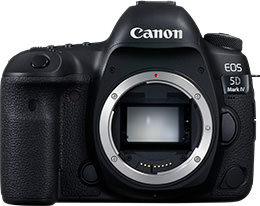As a professional photographer travelling extensively throughout the year, I have to rely heavily on the gear I am taking. I depend on my camera to realise what’s in my mind’s eye – no matter how tough the going gets.
Ever since the arrival of the Canon EOS 5D Mark II, I have been an avid user of the 5D series. The latest addition to the series, the Canon EOS 5D Mark IV, paired with my underwater housing, has been my trusty workhorse for all of my recent underwater photography projects and expeditions.

Canon EOS 5D Mark IV, f/11, 1/250s, ISO 500
A humpback whale mum and calf dancing in front of me.
Some of the most exciting open-ocean subjects to photograph are the humpback whales that migrate to Tonga’s waters from Antarctica every winter. Shooting in only ambient light, it’s imperative to have a top-of-the-line sensor like that found in the Canon EOS 5D Mark IV. Its 30.4-megapixel full-frame CMOS sensor performs flawlessly in these lower-light situations, allowing me to dial in higher ISO settings without introducing any perceptible noise.
While the humpbacks aren’t moving particularly quickly, interactions between individuals involve plenty of action. The Canon EOS 5D Mark IV’s even faster 7fps burst rate, combined with an improved buffer performance, makes it possible to shoot continuously almost nonstop, giving me the luxury of selecting the perfect composition from my image sequences.
See also: Shooting Unpredictable Subjects - Fast Moving
Another challenge with photographing Tonga’s whales is the extreme exposure difference between the animal’s white underbelly and the dark, charcoal coloured upper body. But the incredible dynamic range captured in the Canon EOS 5D Mark IV’s RAW images means that there’s even more latitude than before to bring out all of the fine detail in the final image.

Canon EOS 5D Mark IV, f/11, 1/250s, ISO 640
A playful humpback whale calf in Tonga.
Of course, the image can only ever be as good as the optics allows, and Canon’s lenses are second to none. On previous Tonga trips, I have been using the excellent EF 15mm f/2.8 Fisheye and EF 16-35mm f/2.8L II USM, but this year I was excited to try the EF 11-24mm f/4L USM. With a zoom range in the sweet spot for capturing extreme wide-angle shots, the lens proved to be an amazing tool for shooting big animals like humpbacks up close.
See also: Lens Basics #6: Wide-angle Lenses
With its robust build, high-resolution full-frame sensor, fast continuous shooting ability, and impressive low-light performance, the Canon EOS 5D Mark IV is the ideal camera for the working pro and advanced enthusiast. No matter how challenging the subject, the Canon EOS 5D Mark IV always allows me to get the shot.


































